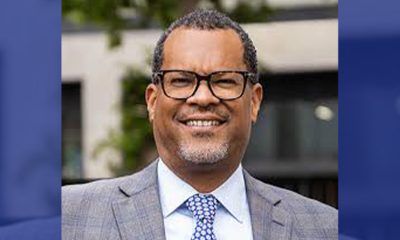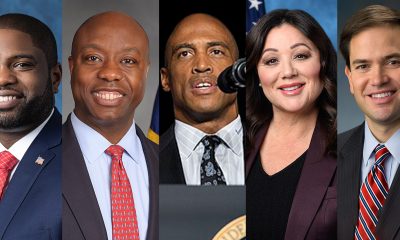Politics
Obama Attorney General Nominee Heads for Vote After 5 Months

In this Jan. 28, 2015 file photo, Attorney general nominee Loretta Lynch appears on Capitol Hill in Washington. President Barack Obama nominated Lynch in November. She now serves as U.S. attorney for the Eastern District of New York. (AP Photo/J. Scott Applewhite, File)
ERICA WERNER, Associated Press
WASHINGTON (AP) — President Barack Obama’s long-stalled nominee for attorney general, federal prosecutor Loretta Lynch, is on her way to a confirmation vote after senators extricated themselves Tuesday from a partisan dispute over abortion that had stood in her way.
An agreement announced by Senate leaders allowed both Republicans and Democrats to save face on a once-uncontroversial bill to help sex-trafficking victims that had turned into a litmus test on abortion.
Although that issue was not connected to Lynch, Senate Republican leader Mitch McConnell had been holding off her nomination vote until the trafficking issue was resolved.
The long delay since Lynch was nominated last fall has provoked increasingly agitated protests from Democrats and Obama, who last week called the situation “embarrassing,” even though Democrats had controlled the Senate for part of that time and had failed to bring her up for a vote.
Lynch, who would become the nation’s first black female attorney general, replacing Eric Holder, is now the U.S. attorney for the Eastern District of New York. She has been waiting 164 days for a vote, far longer than most other recent attorney general nominees.
“I said from the beginning to the end that we’d take up the attorney general nominee just as soon as we finished trafficking,” McConnell told reporters Tuesday in defending his approach. “I’m happy with where we are. We needed to finish the trafficking bill. It was an important bill.”
“Let’s get out of this quickly,” said Democratic leader Harry Reid of Nevada. “Let’s get Loretta Lynch confirmed.”
A vote on final passage of the trafficking bill was expected as early as Wednesday, and the vote on Lynch could come as early as Thursday, though timing was still being worked out.
She is expected to win confirmation with at least five Republicans supporting her. Although her record is widely praised, a number of Republicans have said they can’t support her because of her backing for Obama’s executive moves on immigration.
The new human-trafficking deal aims to address Democratic concerns that the legislation would expand existing prohibitions on spending federal funds for abortions. The legislation envisions a new victims’ fund made up of fees paid by sex criminals, and Democrats said that applying abortion spending prohibitions to that new source of non-taxpayer funds was an expansion they could not accept.
Republicans in turn said they had to be satisfied that existing abortion spending prohibitions would not be curtailed.
The final language, negotiated by Reid and Sens. John Cornyn, R-Texas, and Patty Murray, D-Wash., would resolve that issue by establishing two sources of money for the new victims’ fund. Money collected from the fines assessed on criminal perpetrators would be used for services such as legal aid, but not for health or medical services, and therefore language on abortion would not be relevant. Money already appropriated by Congress for Community Health Centers — and already subject to abortion spending restrictions — would be available for health and medical services.
Obama spokesman Josh Earnest said the White House was reserving judgment until it had a chance to review the final language in the deal, but he also said the endorsement from some Democrats was “certainly an encouraging sign.”
“If we see strong Democratic support, including from champions for women’s health care like Patty Murray, that certainly seems like the kind of thing the president would be able to support,” Earnest said.
The trafficking bill, which passed the Senate Judiciary Committee unanimously, had appeared headed for quick passage through the Senate earlier this year until Democrats started raising alarms about the abortion language. They contended Republicans had sneaked it into the bill, although Democratic Sen. Amy Klobuchar’s office has acknowledged that an aide was aware of it.
The pot of money at issue was quite small, but outside interest groups, including Planned Parenthood, got involved and the bill stalled, even as lawmakers in both parties bemoaned the Senate’s inability to advance such a bill.
Tuesday’s deal allows all sides to claim victory: Republicans for ensuring money for medical procedures is subject to the existing abortion restriction, under a rule known as the “Hyde amendment,” and Democrats for establishing that the Hyde restriction isn’t expanded to a new source of money.
Klobuchar took credit for the two-part approach, which she said in an interview came to her as she was driving through a cornfield in Minnesota. Officials in other offices involved credited Cornyn, Reid, Murray and their aides for negotiating the agreement.
Cecile Richards, president of Planned Parenthood Action Fund, applauded the agreement, saying, “Thankfully, Senators Reid and Murray and other women’s health champions held the line” in the negotiations.
___
Associated Press writer Josh Lederman contributed to this report.
Copyright 2015 The Associated Press. All rights reserved. This material may not be published, broadcast, rewritten or redistributed.
Activism
Gov. Newsom Approves $170 Million to Fast Track Wildfire Resilience
AB 100 approves major investments in regional conservancies across the state, including over $30 million each for the Sierra Nevada, Santa Monica Mountains, State Coastal, and San Gabriel/Lower LA Rivers and Mountains conservancies. An additional $10 million will support wildfire response and resilience efforts.

By Bo Tefu
California Black Media
With wildfire season approaching, last week Gov. Gavin Newsom signed Assembly Bill (AB) 100, unlocking $170 million to fast-track wildfire prevention and forest management projects — many of which directly protect communities of color, who are often hardest hit by climate-driven disasters.
“With this latest round of funding, we’re continuing to increase the speed and size of forest and vegetation management essential to protecting communities,” said Newsom when he announced the funding on April 14.
“We are leaving no stone unturned — including cutting red tape — in our mission to ensure our neighborhoods are protected from destructive wildfires,” he said.
AB 100 approves major investments in regional conservancies across the state, including over $30 million each for the Sierra Nevada, Santa Monica Mountains, State Coastal, and San Gabriel/Lower LA Rivers and Mountains conservancies. An additional $10 million will support wildfire response and resilience efforts.
Newsom also signed an executive order suspending certain regulations to allow urgent work to move forward faster.
This funding builds on California’s broader Wildfire and Forest Resilience Action Plan, a $2.7 billion effort to reduce fuel loads, increase prescribed burning, and harden communities. The state has also launched new dashboards to keep the public informed and hold agencies accountable.
California has also committed to continue investing $200 million annually through 2028 to expand this effort, ensuring long-term resilience, particularly in vulnerable communities.
Activism
California Rideshare Drivers and Supporters Step Up Push to Unionize
Today in California, over 600,000 rideshare drivers want the ability to form or join unions for the sole purpose of collective bargaining or other mutual aid and protection. It’s a right, and recently at the State Capitol, a large number of people, including some rideshare drivers and others working in the gig economy, reaffirmed that they want to exercise it.

By Antonio Ray Harvey
California Black Media
On July 5, 1935, President Franklin D. Roosevelt signed into federal law the National Labor Relations Act (NLRA). Also known as the “Wagner Act,” the law paved the way for employees to have “the right to self-organization, to form, join, or assist labor organizations,” and “to bargain collectively through representatives of their own choosing, according to the legislation’s language.
Today in California, over 600,000 rideshare drivers want the ability to form or join unions for the sole purpose of collective bargaining or other mutual aid and protection. It’s a right, and recently at the State Capitol, a large number of people, including some rideshare drivers and others working in the gig economy, reaffirmed that they want to exercise it.
On April 8, the rideshare drivers held a rally with lawmakers to garner support for Assembly Bill (AB) 1340, the “Transportation Network Company Drivers (TNC) Labor Relations Act.”
Authored by Assemblymembers Buffy Wicks (D-Oakland) and Marc Berman (D-Menlo Park), AB 1340 would allow drivers to create a union and negotiate contracts with industry leaders like Uber and Lyft.
“All work has dignity, and every worker deserves a voice — especially in these uncertain times,” Wicks said at the rally. “AB 1340 empowers drivers with the choice to join a union and negotiate for better wages, benefits, and protections. When workers stand together, they are one of the most powerful forces for justice in California.”
Wicks and Berman were joined by three members of the California Legislative Black Caucus (CLBC): Assemblymembers Tina McKinnor (D-Inglewood), Sade Elhawary (D-Los Angeles), and Isaac Bryan (D-Ladera Heights).
Yvonne Wheeler, president of the Los Angeles County Federation of Labor; April Verrett, President of Service Employees International Union (SEIU); Tia Orr, Executive Director of SEIU; and a host of others participated in the demonstration on the grounds of the state capitol.
“This is not a gig. This is your life. This is your job,” Bryan said at the rally. “When we organize and fight for our collective needs, it pulls from the people who have so much that they don’t know what to do with it and puts it in the hands of people who are struggling every single day.”
Existing law, the “Protect App-Based Drivers and Services Act,” created by Proposition (Prop) 22, a ballot initiative, categorizes app-based drivers for companies such as Uber and Lyft as independent contractors.
Prop 22 was approved by voters in the November 2020 statewide general election. Since then, Prop 22 has been in court facing challenges from groups trying to overturn it.
However, last July, Prop 22 was upheld by the California Supreme Court last July.
In a 2024, statement after the ruling, Lyft stated that 80% of the rideshare drivers they surveyed acknowledged that Prop 22 “was good for them” and “median hourly earnings of drivers on the Lyft platform in California were 22% higher in 2023 than in 2019.”
Wicks and Berman crafted AB 1340 to circumvent Prop 22.
“With AB 1340, we are putting power in the hands of hundreds of thousands of workers to raise the bar in their industry and create a model for an equitable and innovative partnership in the tech sector,” Berman said.
Activism
California Holds the Line on DEI as Trump Administration Threatens School Funding
The conflict began on Feb. 14, when Craig Trainor, acting assistant secretary for civil rights at the U.S. Department of Education (DOE), issued a “Dear Colleague” letter warning that DEI-related programs in public schools could violate federal civil rights law. The letter, which cited Title VI of the Civil Rights Act and the 2023 Supreme Court ruling in Students for Fair Admissions v. Harvard, which ended race-conscious admissions, ordered schools to eliminate race-based considerations in areas such as admissions, scholarships, hiring, discipline, and student programming.

By Joe W. Bowers Jr
California Black Media
California education leaders are pushing back against the Trump administration’s directive to dismantle diversity, equity, and inclusion (DEI) programs in its K-12 public schools — despite threats to take away billions in federal funding.
The conflict began on Feb. 14, when Craig Trainor, acting assistant secretary for civil rights at the U.S. Department of Education (DOE), issued a “Dear Colleague” letter warning that DEI-related programs in public schools could violate federal civil rights law. The letter, which cited Title VI of the Civil Rights Act and the 2023 Supreme Court ruling in Students for Fair Admissions v. Harvard, which ended race-conscious admissions, ordered schools to eliminate race-based considerations in areas such as admissions, scholarships, hiring, discipline, and student programming.
According to Trainor, “DEI programs discriminate against one group of Americans to favor another.”
On April 3, the DOE escalated the pressure, sending a follow-up letter to states demanding that every local educational agency (LEA) certify — within 10 business days — that they were not using federal funds to support “illegal DEI.” The certification requirement, tied to continued federal aid, raised the stakes for California, which receives more than $16 billion annually in federal education funding.
So far, California has refused to comply with the DOE order.
“There is nothing in state or federal law that outlaws the broad concepts of ‘diversity,’ ‘equity,’ or ‘inclusion,’” wrote David Schapira, California’s Chief Deputy Superintendent of Public Instruction, in an April 4 letter to superintendents and charter school administrators. Schapira noted that all of California’s more than 1,000 traditional public school districts submit Title VI compliance assurances annually and are subject to regular oversight by the state and the federal government.
In a formal response to the DOE on April 11, the California Department of Education, the State Board of Education, and State Superintendent of Public Instruction Tony Thurmond collectively rejected the certification demand, calling it vague, legally unsupported, and procedurally improper.
“California and its nearly 2,000 LEAs (including traditional public schools and charter schools) have already provided the requisite guarantee that its programs and services are, and will be, in compliance with Title VI and its implementing regulation,” the letter says.
Thurmond added in a statement, “Today, California affirmed existing and continued compliance with federal laws while we stay the course to move the needle for all students. As our responses to the United States Department of Education state and as the plain text of state and federal laws affirm, there is nothing unlawful about broad core values such as diversity, equity and inclusion. I am proud of our students, educators and school communities who continue to focus on teaching and learning, despite federal actions intended to distract and disrupt.”
California officials say that the federal government cannot change existing civil rights enforcement standards without going through formal rule-making procedures, which require public notice and comment.
Other states are taking a similar approach. In a letter to the DOE, Daniel Morton-Bentley, deputy commissioner and counsel for the New York State Education Department, wrote, “We understand that the current administration seeks to censor anything it deems ‘diversity, equity & inclusion.’ But there are no federal or State laws prohibiting the principles of DEI.”
-

 Activism4 weeks ago
Activism4 weeks agoOakland Post Endorses Barbara Lee
-

 Activism3 weeks ago
Activism3 weeks agoOakland Post: Week of April 2 – 8, 2025
-

 #NNPA BlackPress3 weeks ago
#NNPA BlackPress3 weeks agoTrump Profits, Black America Pays the Price
-

 Activism2 weeks ago
Activism2 weeks agoOakland Post: Week of April 9 – 15, 2025
-

 #NNPA BlackPress3 weeks ago
#NNPA BlackPress3 weeks agoHarriet Tubman Scrubbed; DEI Dismantled
-

 #NNPA BlackPress3 weeks ago
#NNPA BlackPress3 weeks agoTrump Targets a Slavery Removal from the National Museum of African-American History and Culture
-

 #NNPA BlackPress3 weeks ago
#NNPA BlackPress3 weeks agoLawmakers Greenlight Reparations Study for Descendants of Enslaved Marylanders
-

 #NNPA BlackPress3 weeks ago
#NNPA BlackPress3 weeks agoNew York Stands Firm Against Trump Administration’s Order to Abandon Diversity in Schools



























































